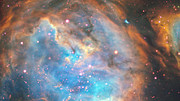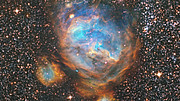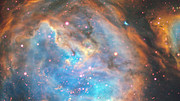Press Release
Bubbles of Brand New Stars
6 February 2019
This dazzling region of newly-forming stars in the Large Magellanic Cloud (LMC) was captured by the Multi Unit Spectroscopic Explorer instrument (MUSE) on ESO’s Very Large Telescope. The relatively small amount of dust in the LMC and MUSE’s acute vision allowed intricate details of the region to be picked out in visible light.
This region of the Large Magellanic Cloud (LMC) glows in striking colours in this image captured by the Multi Unit Spectroscopic Explorer (MUSE) instrument on ESO’s Very Large Telescope (VLT). The region, known as LHA 120-N 180B — N180 B for short — is a type of nebula known as an H II region (pronounced “H two”), and is a fertile source of new stars.
The LMC is a satellite galaxy of the Milky Way, visible mainly from the Southern Hemisphere. At only around 160 000 light-years away from the Earth, it is practically on our doorstep. As well as being close to home, the LMC’s single spiral arm appears nearly face-on, allowing us to inspect regions such as N180 B with ease.
H II regions are interstellar clouds of ionised hydrogen — the bare nuclei of hydrogen atoms. These regions are stellar nurseries — and the newly formed massive stars are responsible for the ionisation of the surrounding gas, which makes for a spectacular sight. N180 B’s distinctive shape is made up of a gargantuan bubble of ionised hydrogen surrounded by four smaller bubbles.
Deep within this glowing cloud, MUSE has spotted a jet emitted by a fledgling star — a massive young stellar object with a mass 12 times greater than our Sun. The jet — named Herbig–Haro 1177, or HH 1177 for short — is shown in detail in this accompanying image. This is the first time such a jet has been observed in visible light outside the Milky Way, as they are usually obscured by their dusty surroundings. However, the relatively dust-free environment of the LMC allows HH 1177 to be observed at visible wavelengths. At nearly 33 light-years in length, it is one of the longest such jets ever observed.
HH 1177 tells us about the early lives of stars. The beam is highly collimated; it barely spreads out as it travels. Jets like this are associated with the accretion discs of their star, and can shed light on how fledgling stars gather matter. Astronomers have found that both high- and low-mass stars launch collimated jets like HH 1177 via similar mechanisms — hinting that massive stars can form in the same way as their low-mass counterparts.
MUSE has recently been vastly improved by the addition of the Adaptive Optics Facility , the Wide Field Mode of which saw first light in 2017. Adaptive optics is the process by which ESO’s telescopes compensate for the blurring effects of the atmosphere — turning twinkling stars into sharp, high-resolution images. Since obtaining these data, the addition of the Narrow Field Mode, has given MUSE vision nearly as sharp as that of the NASA/ESA Hubble Space Telescope — giving it the potential to explore the Universe in greater detail than ever before.
More information
This research was presented in a paper entitled “An optical parsec-scale jet from a massive young star in the Large Magellanic Cloud” which appeared in the journal Nature.
The research team was composed of A. F. McLeod (who conducted this research while at the University of Canterbury, New Zealand and is now affiliated with the Department of Astronomy, University of California, Berkeley, and the Department of Physics and Astronomy, Texas Tech University, USA), M. Reiter (Department of Astronomy, University of Michigan, Ann Arbor, USA), R. Kuiper (Institute of Astronomy and Astrophysics, University of Tübingen, Germany), P. D. Klaassen (UK Astronomy Technology Centre, Royal Observatory Edinburgh, UK) and C. J, Evans (UK Astronomy Technology Centre, Royal Observatory Edinburgh, UK).
ESO is the foremost intergovernmental astronomy organisation in Europe and the world’s most productive ground-based astronomical observatory by far. It has 16 Member States: Austria, Belgium, Czechia, Denmark, France, Finland, Germany, Ireland, Italy, the Netherlands, Poland, Portugal, Spain, Sweden, Switzerland and the United Kingdom, along with the host state of Chile and with Australia as a Strategic Partner. ESO carries out an ambitious programme focused on the design, construction and operation of powerful ground-based observing facilities enabling astronomers to make important scientific discoveries. ESO also plays a leading role in promoting and organising cooperation in astronomical research. ESO operates three unique world-class observing sites in Chile: La Silla, Paranal and Chajnantor. At Paranal, ESO operates the Very Large Telescope and its world-leading Very Large Telescope Interferometer as well as two survey telescopes, VISTA working in the infrared and the visible-light VLT Survey Telescope. ESO is also a major partner in two facilities on Chajnantor, APEX and ALMA, the largest astronomical project in existence. And on Cerro Armazones, close to Paranal, ESO is building the 39-metre Extremely Large Telescope, the ELT, which will become “the world’s biggest eye on the sky”
Links
Contacts
Anna McLeod
Postdoctoral Research Fellow — Texas Tech University & University of California Berkeley
Tel: +1 80 6834 2588
Email: anna.mcleod@ttu.edu
Calum Turner
ESO Public Information Officer
Garching bei München, Germany
Tel: +49 89 3200 6670
Email: pio@eso.org
About the Release
| Release No.: | eso1903 |
| Name: | LHA 120-N 180B |
| Type: | Local Universe : Nebula : Type : Star Formation |
| Facility: | Very Large Telescope |
| Instruments: | MUSE |
| Science data: | 2018Natur.554..334M |
Our use of Cookies
We use cookies that are essential for accessing our websites and using our services. We also use cookies to analyse, measure and improve our websites’ performance, to enable content sharing via social media and to display media content hosted on third-party platforms.
ESO Cookies Policy
The European Organisation for Astronomical Research in the Southern Hemisphere (ESO) is the pre-eminent intergovernmental science and technology organisation in astronomy. It carries out an ambitious programme focused on the design, construction and operation of powerful ground-based observing facilities for astronomy.
This Cookies Policy is intended to provide clarity by outlining the cookies used on the ESO public websites, their functions, the options you have for controlling them, and the ways you can contact us for additional details.
What are cookies?
Cookies are small pieces of data stored on your device by websites you visit. They serve various purposes, such as remembering login credentials and preferences and enhance your browsing experience.
Categories of cookies we use
Essential cookies (always active): These cookies are strictly necessary for the proper functioning of our website. Without these cookies, the website cannot operate correctly, and certain services, such as logging in or accessing secure areas, may not be available; because they are essential for the website’s operation, they cannot be disabled.
Functional Cookies: These cookies enhance your browsing experience by enabling additional features and personalization, such as remembering your preferences and settings. While not strictly necessary for the website to function, they improve usability and convenience; these cookies are only placed if you provide your consent.
Analytics cookies: These cookies collect information about how visitors interact with our website, such as which pages are visited most often and how users navigate the site. This data helps us improve website performance, optimize content, and enhance the user experience; these cookies are only placed if you provide your consent. We use the following analytics cookies.
Matomo Cookies:
This website uses Matomo (formerly Piwik), an open source software which enables the statistical analysis of website visits. Matomo uses cookies (text files) which are saved on your computer and which allow us to analyze how you use our website. The website user information generated by the cookies will only be saved on the servers of our IT Department. We use this information to analyze www.eso.org visits and to prepare reports on website activities. These data will not be disclosed to third parties.
On behalf of ESO, Matomo will use this information for the purpose of evaluating your use of the website, compiling reports on website activity and providing other services relating to website activity and internet usage.
Matomo cookies settings:
Additional Third-party cookies on ESO websites: some of our pages display content from external providers, e.g. YouTube.
Such third-party services are outside of ESO control and may, at any time, change their terms of service, use of cookies, etc.
YouTube: Some videos on the ESO website are embedded from ESO’s official YouTube channel. We have enabled YouTube’s privacy-enhanced mode, meaning that no cookies are set unless the user actively clicks on the video to play it. Additionally, in this mode, YouTube does not store any personally identifiable cookie data for embedded video playbacks. For more details, please refer to YouTube’s embedding videos information page.
Cookies can also be classified based on the following elements.
Regarding the domain, there are:
- First-party cookies, set by the website you are currently visiting. They are stored by the same domain that you are browsing and are used to enhance your experience on that site;
- Third-party cookies, set by a domain other than the one you are currently visiting.
As for their duration, cookies can be:
- Browser-session cookies, which are deleted when the user closes the browser;
- Stored cookies, which stay on the user's device for a predetermined period of time.
How to manage cookies
Cookie settings: You can modify your cookie choices for the ESO webpages at any time by clicking on the link Cookie settings at the bottom of any page.
In your browser: If you wish to delete cookies or instruct your browser to delete or block cookies by default, please visit the help pages of your browser:
Please be aware that if you delete or decline cookies, certain functionalities of our website may be not be available and your browsing experience may be affected.
You can set most browsers to prevent any cookies being placed on your device, but you may then have to manually adjust some preferences every time you visit a site/page. And some services and functionalities may not work properly at all (e.g. profile logging-in, shop check out).
Updates to the ESO Cookies Policy
The ESO Cookies Policy may be subject to future updates, which will be made available on this page.
Additional information
For any queries related to cookies, please contact: pdprATesoDOTorg.
As ESO public webpages are managed by our Department of Communication, your questions will be dealt with the support of the said Department.








